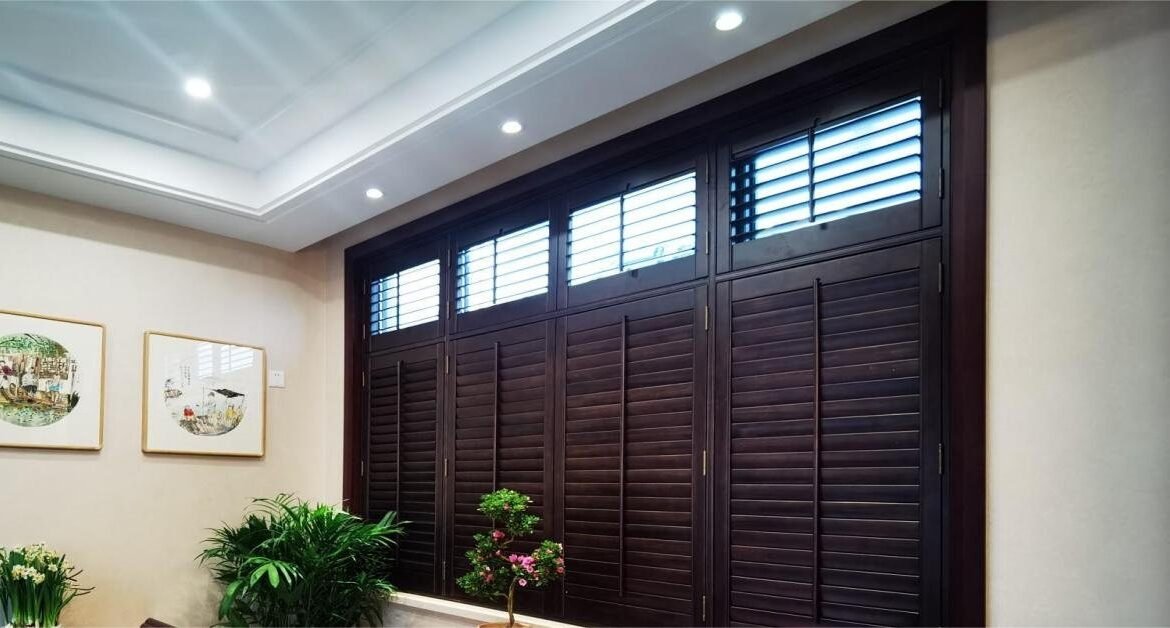Plantation shutters are window treatments that feature adjustable louvers that can be opened or closed to control the room’s light and privacy. They are popular among homeowners and designers because they provide a timeless look that complements any decor style, from traditional to contemporary. Choosing the right material for plantation shutters is crucial as it can affect your windows’ functionality, durability, and overall appearance. Different materials offer various advantages and disadvantages, so it’s essential to consider your needs and preferences when selecting the best option for your home.
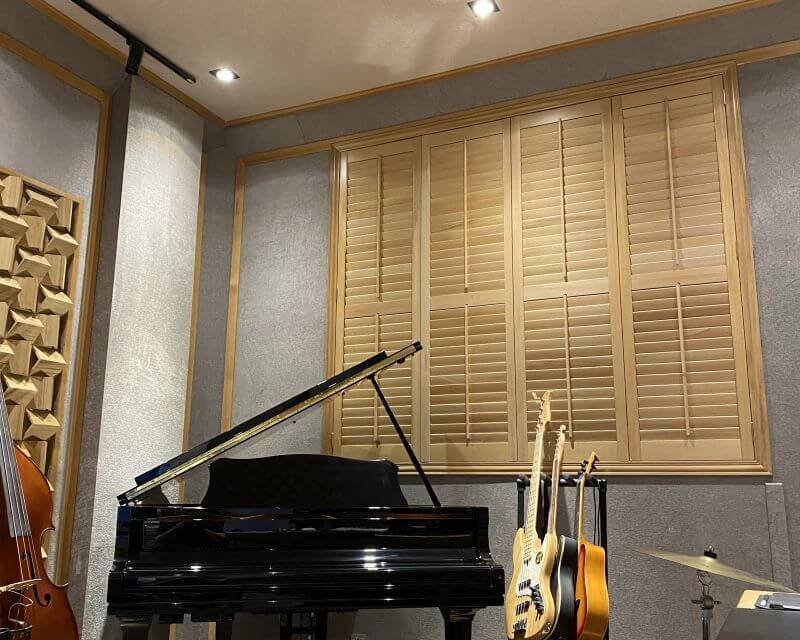
For example, wood shutters provide a natural, warm look that can enhance the beauty of any room. However, they may not be the best option for high-humidity areas or rooms with moisture, as they can warp or rot. On the other hand, vinyl shutters are an affordable and low-maintenance option that is resistant to moisture and fading. Still, they may not offer the same level of durability as wood.
What is The Best Material for Shutters?
Plantation shutters are a timeless window treatment option that can add style and functionality to your home. When choosing the best material for plantation shutters, several options exist.
One popular material for plantation shutters is wood. Wood shutters have a natural beauty and classic appeal that can add warmth and elegance to any room. They can be stained or painted to match your home’s décor and are available in various wood types, such as basswood, cedar, and oak. However, wood shutters can be more expensive than other materials and may require more maintenance to keep them in good condition.
Another option to consider is vinyl plantation shutters. Vinyl shutters are a cost-effective alternative to wood shutters, requiring less maintenance. They are also more resistant to moisture and humidity, making them a good choice for bathrooms and kitchens. However, they may not have the same durability and aesthetic appeal as wood shutters.
Finally, composite plantation shutters are another option to consider. They are made from a combination of wood and synthetic materials, such as PVC. Composite shutters offer the look and feel of natural wood but are more durable and moisture-resistant. They can be a good compromise between wood and vinyl shutters in terms of cost and quality.
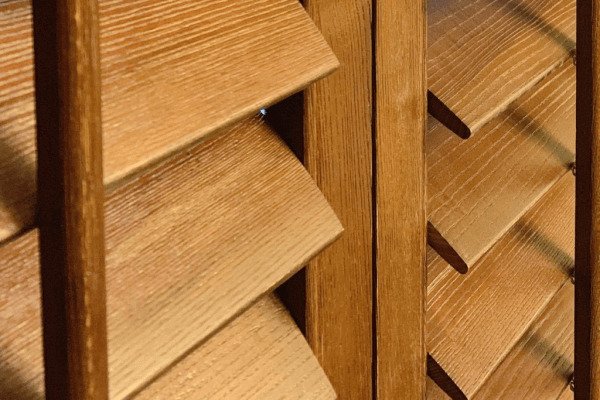
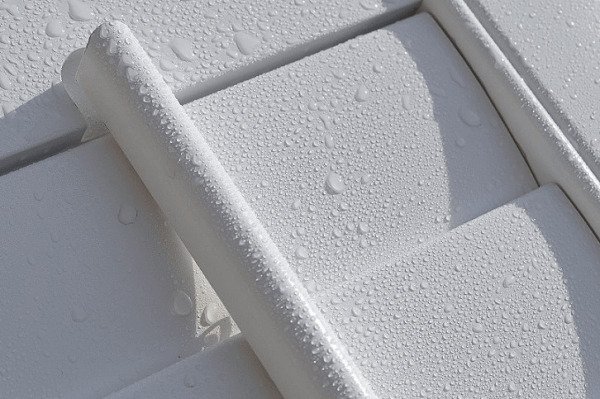
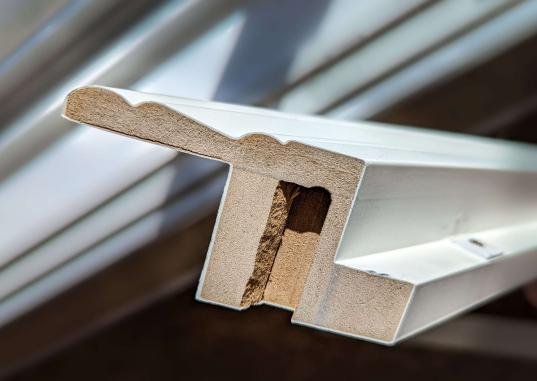
Ultimately, the suitable material for your plantation shutters will depend on your lifestyle, home decor, and budget. By taking the time to research and understand the different materials available and consulting with a professional, you can make an informed decision that will enhance the value and beauty of your home for years to come.
Wood Plantation Shutters
There’s something about natural wood plantation shutters that can’t be beaten. They’ve been around for centuries and are a popular choice among shutter manufacturers today. When it comes to interior shutters, there are a few popular wood species that homeowners go with. Each type of shutter has a different look and feel, whether it’s the deep grain of white ash or the smooth surface of plantation-grown poplar. No matter your budget, there’s sure to be a wooden shutter option that’s perfect for you.
Not sure which wood to get? Here are the five most popular wood species used in shutters.
Here are some of the advantages and disadvantages of choosing wood plantation shutters:
Advantages:
- Aesthetic appeal: Wood shutters provide a warm and natural look that adds a touch of elegance to any room.
- Customizable: Wood shutters can be custom-made to fit any window size and shape, ensuring a perfect fit and maximum light control.
- Durable: High-quality wood shutters are durable and long lasting, making them a good investment for homeowners.
- Insulation: Wood shutters can provide excellent insulation, helping to regulate temperature and reduce energy costs.
- Increase home value: Wood shutters are a timeless feature that can enhance the value and appeal of your home.
Disadvantages:
- Cost: Wood shutters can be more expensive than other materials, especially for oversized windows or custom shapes.
- Maintenance: Wood shutters require regular maintenance, including cleaning, dusting, and refinishing to prevent warping, cracking, or fading.
- Moisture sensitivity: Wood is a natural material sensitive to moisture, making it less suitable for high-humidity areas like bathrooms or kitchens.
- Environmental impact: Wood shutters are made from natural resources and may not be the most environmentally friendly option compared to other materials.
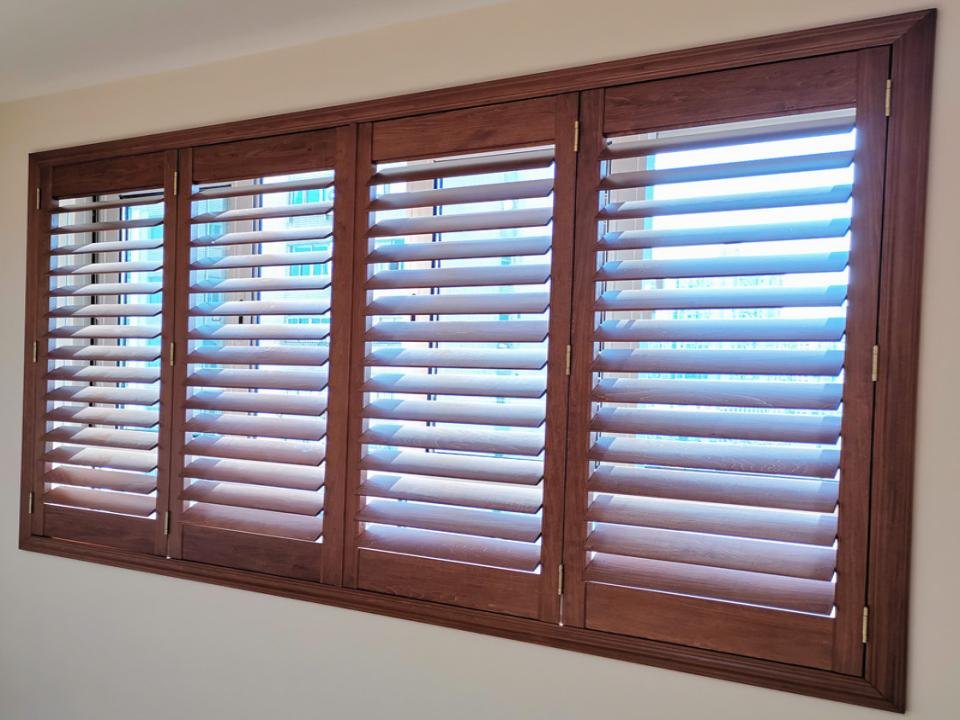
Overall, wood plantation shutters are an excellent choice for homeowners who value a classic, elegant look and are willing to invest in the maintenance and upkeep required for the long-term durability of the shutters. They are highly customizable, provide excellent insulation and light control, and can enhance the value of your home. However, they may not be the best option for high-humidity areas or for those looking for a more eco-friendly alternative.
Vinyl Plantation Shutters
Vinyl plantation shutters are an affordable and low-maintenance option for homeowners who want a durable and versatile window treatment.
Here are some of the advantages and disadvantages of choosing vinyl plantation shutters:
Advantages:
- Cost-effective: Vinyl shutters are generally less expensive than wood or composite shutters, making them a more affordable option for homeowners on a budget.
- Durability: Vinyl shutters are resistant to moisture, warping, and fading, making them ideal for high-humidity areas like bathrooms or kitchens.
- Low-maintenance: Vinyl shutters are easy to clean and require little to no maintenance, making them a convenient choice for busy homeowners.
- Customizable: Vinyl shutters can fit any window size and shape, providing maximum light control and privacy.
- Energy-efficient: Vinyl shutters can help regulate temperature and reduce energy costs by providing insulation for your windows.
Disadvantages:
- Limited color options: Vinyl shutters are available in a limited range of colors and finishes, which may not match the decor of every room.
- Aesthetic appeal: Some homeowners may prefer the natural look and warmth of wood or composite shutters over the synthetic face of vinyl.
- Reduced resale value: Vinyl shutters may not add as much value to a home as wood or composite shutters, considered higher-end materials.
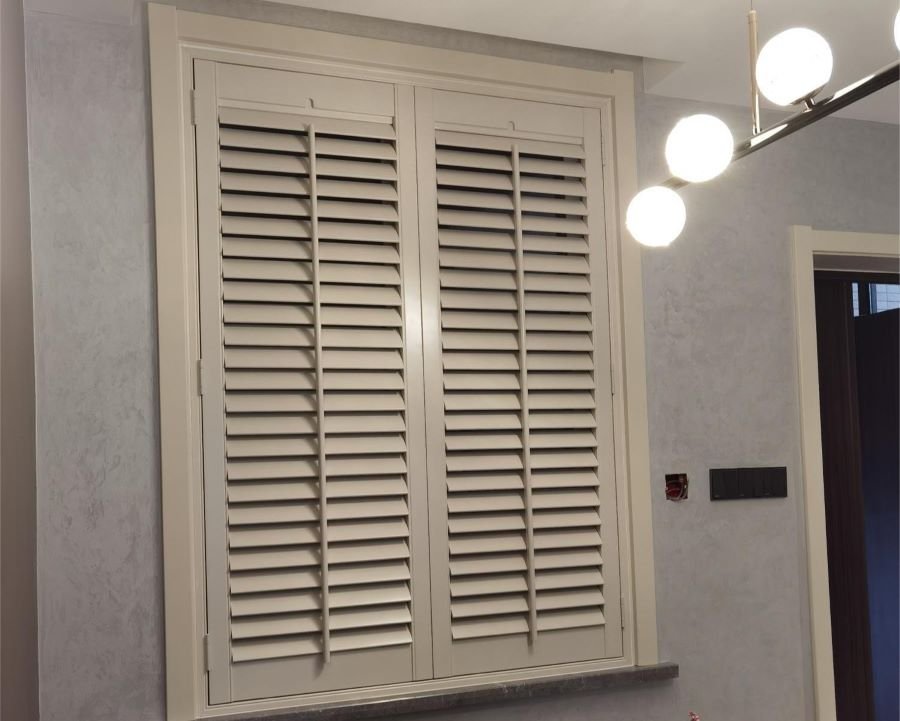
Overall, vinyl plantation shutters are an excellent choice for homeowners who want a low-maintenance, durable, and energy-efficient window treatment without breaking the bank. They are customizable and ideal for high-humidity areas but may not provide the same aesthetic appeal or resale value as wood or composite shutters.
Composite Plantation Shutters
Composite plantation shutters are a popular choice for homeowners who want the look of wood without the high cost and maintenance.
Here are some of the advantages and disadvantages of choosing composite plantation shutters:
Advantages:
- Aesthetic appeal: Composite shutters provide the look and feel of wood, making them a stylish and elegant option for any room.
- Durability: Composite shutters are made of engineered wood, which makes them more durable and resistant to warping, cracking, or fading than natural wood shutters.
- Customizable: Composite shutters can fit any window size and shape, ensuring maximum light control and privacy.
- Moisture-resistant: Composite shutters are ideal for high-humidity areas like bathrooms or kitchens as they are resistant to moisture and humidity.
- Eco-friendly: Composite shutters are made from recycled materials, making them more eco-friendly than wood shutters.
Disadvantages:
- Cost: Composite shutters can be more expensive than vinyl shutters but less expensive than wood shutters, depending on the brand and quality.
- Limited color options: Composite shutters are available in a limited range of colors and finishes, which may not match the decor of every room.
- Susceptible to damage: Composite shutters can be prone to scratching or denting under impact.
- Maintenance: Composite shutters require occasional cleaning and dusting to maintain their appearance.

Overall, composite plantation shutters are an excellent choice for homeowners who want the aesthetic appeal of wood shutters without the high cost and maintenance. They are durable, moisture-resistant, and eco-friendly, ideal for high-humidity areas. However, they may be more expensive than vinyl shutters and have limited color options.
Which Plantation Shutters are The Best?
Wood shutters provide a classic and elegant look but require high maintenance and are more expensive than other materials. Vinyl shutters are cost-effective and low-maintenance but may not offer the same aesthetic appeal or resale value as wood or composite shutters. Composite shutters provide the aesthetic appeal of wood without the high cost and maintenance but may be more expensive than vinyl shutters.
When choosing the best material for plantation shutters, there are several factors to consider, including your budget, the climate in your area, the decor of your home, and your maintenance preferences.
Budget
When choosing shutters for your home, the budget will play a significant role in limiting your options. Real wood shutters are generally more expensive than composite or PVC shutters because wood is a natural resource. Manufacturing wooden shutters can be costly due to the lengthy and laborious process. However, composite and PVC shutters are made artificially and tend to be more affordable than their wooden counterparts. So, depending on your budget, you may sacrifice some aesthetics for cost-effectiveness.
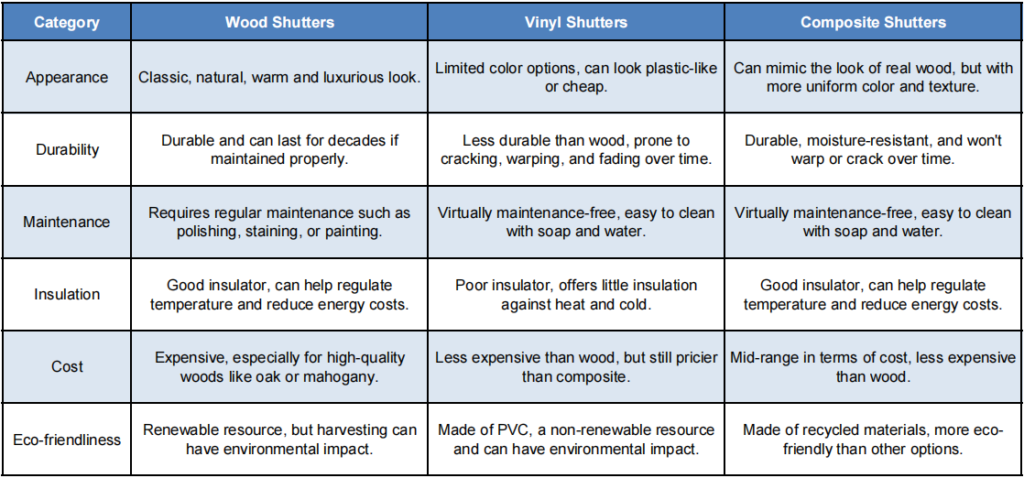
Aesthetics
There are many reasons why natural wood is the better choice for window shutters. Not only is it more aesthetically pleasing, but it is also more durable and long-lasting. The most noticeable difference between natural wood and faux wood shutters is that real wood shutters can come in various colors. They can also be sanded and stained to create different colors and textures, giving you more options when decorating your home. While PVC or composite shutters provide you with what you see, they are more limited in color options.
Size
When deciding on shutter material, size is an important consideration. Small shutters give you more leeway in terms of what will work well. Both wood, PVC, and composite shutters can be good choices for small shutters. However, larger shutters need more stability and durability, which limits your options to materials such as wood. Wood is much stronger and lighter than PVC or composite material, so it is a good choice for large shutters. PVC and composite Shutters may warp and sag over time, so they are not as ideal for large shutters.
Climate
Any material you choose for your shutters will work fine when you live in drier climates. PVC and composite shutters are the best choices for humid climates where condensation gathers, such as in your kitchen or bathroom. These materials are highly resistant to humidity and wet weather, making them ideal for areas where condensation commonly forms, such as kitchens and bathrooms. Wood shutters can start to rot in damp climates, so regular maintenance is necessary to keep them in good condition.
Color
When choosing the color and finish of your plantation shutters, consider your home’s overall style and aesthetic. A neutral palette can create a timeless look, while a bold color or textured finish adds personality and visual interest. It’s also important to consider how the shutters will complement your existing decor and furnishings.
In addition to standard color options, some manufacturers offer custom color-matching services, allowing you to create a unique look for your home. Some popular color options for plantation shutters include white, cream, gray, black, and natural wood tones.
Maintenance
Although wooden shutters can add much character to a home, they require more maintenance than composite or PVC shutters. Wooden shutters are susceptible to mold, pests, and moisture, so you’ll need to regularly check and clean them to keep them in good condition. Composite and PVC shutters are made of a plastic-based material less likely to mold or decay over time and can be easily cleaned with a wipe-down.
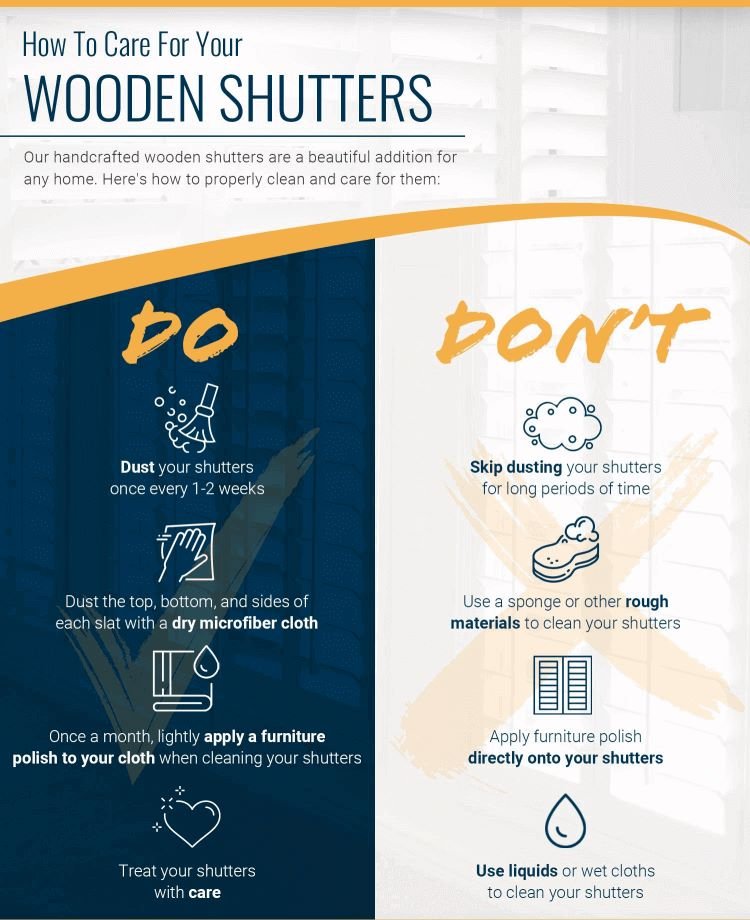
Choosing the suitable material for your plantation shutters is a personal decision that requires careful consideration of these factors. By weighing the advantages and disadvantages of each material and considering your specific needs and preferences, you can select the best material that will meet your requirements and complement the style of your home.

